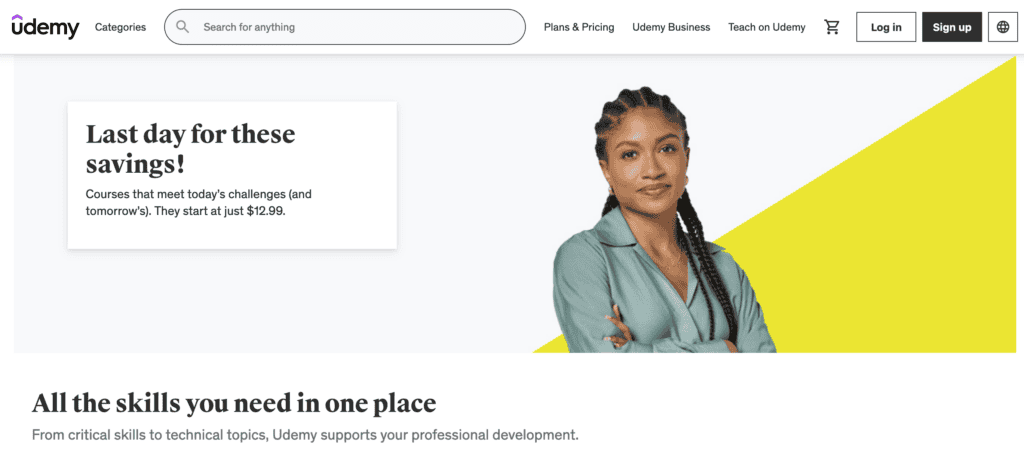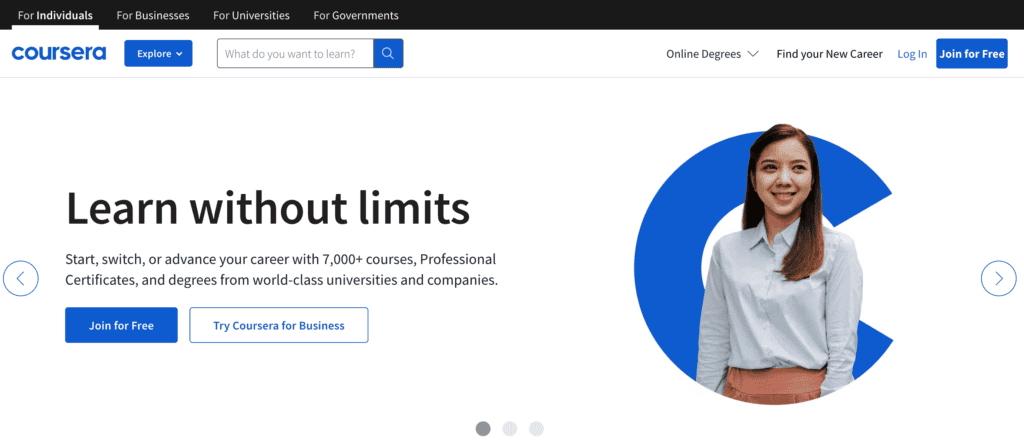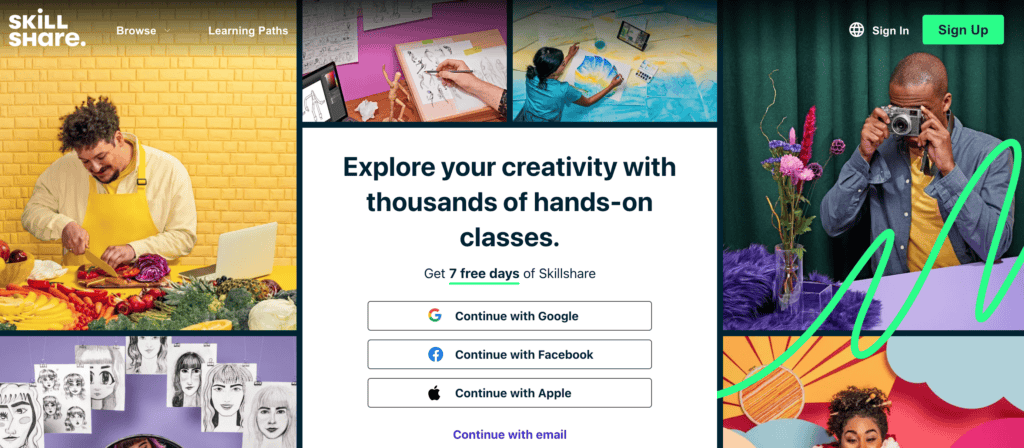If you are new to the world of online courses, leveraging an online learning platform can be a great starting point.
Online learning platforms are beginner-friendly and can provide the tools and support you need to launch and manage your course effectively.
There are many of these platforms available on the market today, so to help you choose the right option for you, this article will introduce the key factors to think about when making your choice and present the top online learning platforms to consider in 2024.
The Difference Between Online Learning Platforms vs. Online Course Platforms
It’s easy to get confused with the different types of online learning solutions available on the market today, because there are many options available for many different needs and use cases.
This article is about the best online learning platforms, but first, let’s clarify the difference between online learning platforms and online course platforms.
What Is an Online Course Platform?
An online course platform is a platform that allows you to create, host, and sell your own online courses.
This online learning solution is ideal if you are looking to sell and grow your online classes, particularly in the case that:
- You are an entrepreneur with an already-established audience
- You are wanting to make online courses your primary source of income
- You are wanting to sell online training to companies
Online course platforms give course creators more control and usually offer some amount of freedom when it comes to branding and marketing. They also may offer sales and marketing features that make it easier to sell your courses.
Online course platforms can be complex to set up, and so it’s worth your time to do your research and preparation before deciding which is the right platform for your needs. For a comprehensive explanation of the different online course solutions that exist for different needs and use cases, check out our article on how to choose the right course platform.
What Is an Online Learning Platform?
An online learning platform, on the other hand, is a marketplace where students can find and take online courses from various creators, similar to an online library. It’s commonly referred to as an “online course marketplace,” because like a marketplace in the real world, you can find offerings from many different creators in one place. Users can explore a wide catalog to find courses matching their interests and desired learning resources (courses, tutorials, videos, etc.).
This type of online learning solution is great for course creators looking to test out online courses as a side project, since it offers:
- An existing audience: Platforms have established user bases, making it easier to find potential students
- Marketing assistance: Many platforms will take care of marketing your course for you (to a greater or lesser extent)
- Lower course creation costs
- Less time spent creating your online course
- An overall easier course creation process.
There are certain drawbacks to online learning platforms, including:
- Limited control: Creators have minimal influence over branding, marketing, and student communication.
- Growth limitations: Dependence on the platform’s audience reach can hinder building a dedicated following.
In this article, we will be focusing on online learning platforms, and there are two main subtypes you should be aware of: Open course marketplaces and university-affiliated platforms.
Open Course Marketplaces
Open course marketplaces function similarly to online stores where anyone can potentially list and sell their courses.
Students can find an enormous range of courses due to the open nature of the platform. The barrier to entry for instructors is typically low. The downside can be that the quality of the courses can vary widely.
University-Affiliated Course Marketplaces
The focus of university-affiliated course marketplaces is on delivering university-level education.
The courses offered are primarily developed and delivered by accredited institutions like universities and colleges. These platforms implement stricter quality control measures and ensure instructors possess relevant expertise.
That means students have access to high-quality content and can potentially earn recognized credentials, but they may find fewer course options than on open course marketplaces and costs may be higher.
Online Learning Platforms: Key Considerations
Before you decide which online learning platform you want to use to create your course, there are a few things you need to keep in mind, both for yourself as the course creator and for your future students.
For Course Creators
When shopping around for online learning platforms, it’s important to consider:
- Marketing options: Does the platform offer built-in marketing tools like email marketing, social media integration, and advertising options to reach potential students?
- Student communication tools: Does the platform offer features like discussion forums, chat rooms, and messaging functionalities to facilitate communication with learners?
- Revenue share structures: What percentage of the course revenue does the platform keep? Are there different pricing plans or subscription models available?
It’s also worth considering how difficult or easy it would be to take your content to another platform should you ever choose to do so.
For Learners
It’s also important to think about your potential students and how they will approach choosing a course platform, since many are subscription based and may “lock in” a student to that particular platform.
- Learning format: Does the platform offer a variety of learning formats, such as video lectures, quizzes, interactive exercises, and downloadable materials?
- Course variety: Does the platform offer a wide range of courses in their area of interest or desired field of study?
- Community support: Does the platform provide opportunities to connect with other learners and instructors through forums, groups, or mentorship programs?
- Potential recognized certificates: Do the courses offered on the platform provide recognized certificates or completion badges that hold value in the job market or for professional development?
Depending on the type of learner you’re hoping to attract, these considerations may be important to them when they decide where they choose to learn. Since you are likely choosing an online learning platform partially because of the build-in audience of students, choosing the one where your students are already likely to be is a good idea.
The Top 5 Online Learning Platforms
1. Udemy


Udemy is an open online learning platform, renowned for its expansive course library and diverse pricing options. Offering courses across a multitude of subjects and skill levels, Udemy’s primarily video-based format supplemented with interactive elements caters to various learning preferences. Notably, instructors retain the autonomy to set course prices (unlike many other online learning platforms), with the platform claiming a share.
Pros and Cons
- No cost to join the platform as an instructor
- Access to an extensive base of online course buyers
- Easy to set up your course
- Option to provide a completion certificate for every student
- Access to the Teaching Center, instructor community, and a very responsive support team
- Instructors only get 37% from every course sale they make on the platform
- You have no control over how your course is promoted
Who Should Use Udemy?
For Course Creators: Udemy presents an enticing option for those equipped with robust marketing skills. While it offers access to a vast user base, creators must actively promote their courses through external channels like social media or email marketing to get noticed.
For Learners: Individuals seeking a wide-ranging course selection and diverse learning formats will find Udemy particularly appealing. It boasts the most extensive array of courses compared to other platforms on this list.
Pricing
Udemy operates on a revenue sharing model. Instructors can use a referral link to send students to their course, in which case they keep 97% of the revenue. For students that find the course through the Udemy website, instructors get only 37% of the revenue.
Reviews
Capterra: 4.6
G2: 4.5
2. Coursera


Coursera focuses on academic content and providing certificates from esteemed institutions. Collaborating with universities and institutions for course development, Coursera offers comprehensive courses across various fields. The platform’s verified certificates, backed by prestigious institutions, carry significant value in professional and academic realms.
Pros and Cons
-
Credibility and prestige
-
Accreditation available
-
Structured learning paths
-
Platform promotes courses
-
Additional marketing tools available to instructors
-
Strict quality control measures can be challenging for new instructors
-
Limited creative control (content delivery must adhere to institutional guidelines)
-
Limited direct communication options
-
Limited course options for learners
-
Higher costs for learners
Who Should Use Coursera?
- Course creators: Instructors affiliated with universities and institutions. Course creation primarily falls under these entities
- Learners: Individuals seeking academic content and certifications — Coursera offers in-depth courses developed by professors and experts from top universities and institutions.
Pricing
You must be affiliated with a university or industry institution to partner with Coursera.
Reviews
Capterra: 4.5
G2: 4.5
3. Skillshare


Skillshare focuses on teaching creative skills such as design, animation, and photography. Offering short, project-oriented courses supplemented with video lessons and downloadable resources, Skillshare fosters an active community with a project feedback system. Because Skillshare is subscription-based for learners, teachers do not get to set their own course prices. Revenue sharing is based on student watch time, ensuring instructors are fairly compensated.
Pros and Cons
- No fee to join as an instructor
- Easy application and onboarding process
- User-friendly platform that makes setting up your courses very intuitive
- High earning potential
- Access to the Teacher Help Center
- No control over your earnings. The platform will calculate your monthly course earnings based on factors like minutes watched and student engagement
- Certain course topics aren’t allowed (such as spirituality, mathematics, pet care, and fitness)
- Periodic limits on new class categories
Who Should Use Skillshare?
For Course Creators: Skillshare is ideal for instructors who specialize in creative domains and seek to engage with a community-driven platform. The subscription-based model provides a recurring income stream, fostering long-term sustainability for instructors.
For Learners: Individuals interested in exploring creative skills through short, practical courses will find Skillshare particularly suitable. The platform’s focus on project-oriented learning and active community engagement enhances the learning experience for aspiring creatives.
Pricing
Skillshare pays approximately 20% of its overall revenue to teachers. Individual teacher compensation is calculated based on minutes watched (as compared to other teachers) with bonuses for meaningful engagement from students.
Reviews
Capterra: 4.7
G2: 3.3
4. edX


edX is renowned for providing in-depth learning experiences in specific subjects, accompanied by valuable certificates. Offering Massive Open Online Courses (MOOCs) from prestigious institutions, edX closely resembles traditional university classes, featuring video lectures, quizzes, and exams. The platform primarily focuses on STEM fields, humanities, and social sciences, catering to a wide range of academic interests.
Pros and Cons
-
Association with renowned universities
-
Global reach
-
Discussion forums
-
Learners have the potential for certification
-
Competitive landscape for course creators
-
Limited control over course content and delivery
-
Limited marketing options for individual creators
-
Limited community features
Who Should Use edX?
For Course Creators: edX is best suited for instructors from accredited institutions looking to share their knowledge with a global audience. While the competitive landscape may pose challenges, the association with renowned universities enhances credibility and reach.
For Learners: Individuals seeking an in-depth learning experience from prestigious institutions and potentially earning certificates will find edX particularly valuable. The platform’s rigorous courses, backed by prestigious universities, provide a comprehensive learning environment for academic and professional growth.
Pricing
edX partners with universities and leading institutions to create courses.
Reviews
Capterra: 4.9
G2: 4.5
5. LinkedIn Learning


LinkedIn Learning is a platform dedicated to professional development and career-oriented skills. With courses designed to align with in-demand job skills and industry trends, LinkedIn Learning leverages the extensive LinkedIn network for promotion. The platform offers video lectures, quizzes, and structured learning paths to enhance skill acquisition and career growth.
Pros and Cons
-
Potential to build a professional network
-
Completion certificates hold value
-
Course subjects aligned with in-demand job skills
-
Offline access
-
One-month free trial
-
Limited communication options
-
Instructors are LinkedIn Learning employees (revenue goes to the platform)
-
Limited community features
Who Should Use LinkedIn Learning?
For Course Creators: LinkedIn Learning is suitable for instructors teaching in-demand job skills and aiming to expand their professional network. It’s important to note that instructors must apply to LinkedIn as employees, as instructors are employees of LinkedIn Learning.
For Learners: LinkedIn Learning caters to individuals seeking professional development and career advancement opportunities. The platform’s courses are tailored to address the needs of professionals looking to enhance their skill set and stay abreast of industry trends.
Pricing
Instructors must apply to LinkedIn and become employees of LinkedIn Learning.
Reviews
Capterra: 4.7
G2: 4.4



